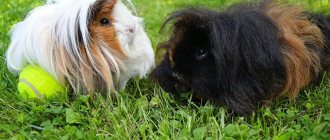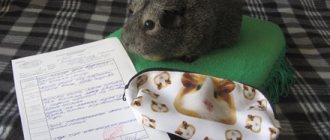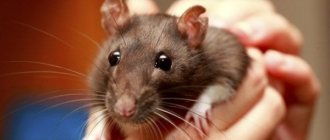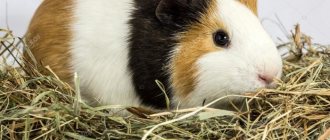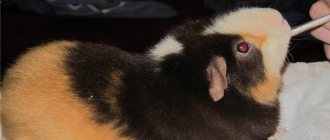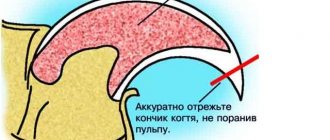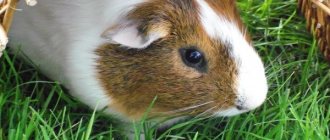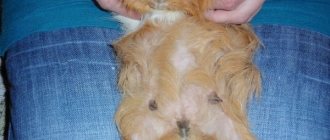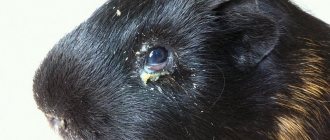"Behavioral Dictionary" of Guinea Pigs
Many animal movements, coupled with sounds, carry information.
If a guinea pig chatters its teeth, it means it is experiencing strong negative emotions. In nature, a rodent uses such actions to scare away the enemy and warn of a possible attack.
If such aggressive behavior is directed at the owner himself, the person should not continue communication - the pet may even bite him.
Teeth chattering is often accompanied by a soft squeaking sound. This translates as a message of discomfort. Strong hugs from a person, too intrusive communication, or hostility towards a neighbor can cause aggression, which the rodent reports.
Sometimes dental tapping occurs against the background of whistling, which no longer means a warning, but the beginning of a war. In this case, you should not try to smooth out the hostility, but leave him alone or remove the irritating object.
If a pig is clicking its teeth and trembling, it is very frightened or alarmed by something. This condition can be caused by a new object in the cage: a toy, a drinking bowl, a house. Changing ownership causes fear and excitement. The unknown is stressful for a rodent.
But such behavior is also typical if the animal is cold or has a cold.
Important! Teeth chattering and grinding should not be confused. A rodent creaks its jaws when it has parasites.
Common dental pathologies in guinea pigs
Let's look at the pathologies that occur most often in domestic guinea pigs.
Dental injuries
Your pet's incisors become damaged as a result of mechanical damage. For example, the animal gnawed the bars of the cage, fell from a great height, or got into a fight with another pet. In such cases, the reasons for contacting a veterinarian are:
- a sharp edge that scratches soft tissues - cheeks, tongue;
- broken incisors have split down to the gums or have begun to crumble.
The doctor uses special tools to file the chip. The procedure requires special skills and is performed under anesthesia. Doing this at home is unsafe and painful for the animal. After teeth trimming, you should feed your pig only soft food, excluding hard food for a while. Further destruction is prevented by a course of vitamin C or calcium. The corresponding drugs are sold in veterinary pharmacies.
Tooth loss
Throughout their lives, pigs sometimes lose 1-2 teeth; this is a physiological norm. They grow back within 2-3 weeks. During this period, it is better to protect your pet from solid food. If the upper teeth fall out, followed immediately by the lower ones, with a total number of more than two, this is a pathology. Most likely, your pet lacks calcium or has gum disease.
Malocclusion
Malocclusion is an incorrect bite. It is caused by poor diet, infectious disease or hereditary pathology.
An incorrect bite can be easily identified visually. The incisors grow sideways, the jaw does not close and is crooked. When a guinea pig's back teeth grow, they push against the tongue and cheeks, leading to the formation of stomatitis, fistulas or gumboils. It hurts the animal to eat and its weight decreases.
To treat pathology, the doctor takes an x-ray to see all abnormalities more clearly. Overgrown incisors are ground down and the curvature is corrected with an elastic bandage. Fluxes and fistulas are eliminated surgically using anesthesia.
Tooth root lengthening
Pathological elongation involves roots growing into soft tissue, sinuses, or the area under the eyes. The process is characterized by a violation of the symmetry of the muzzle: one or both eyes enlarge, swelling forms on the cheeks. The pet shows signs of pain - clicking its teeth, refusing food. Purulent discharge from the eyes and nose is also possible.
The doctor takes an X-ray of the jaw and then trims the overgrown crowns. In advanced cases, the tooth must be completely removed. Afterwards, the animal’s jaw is tied with an elastic bandage to restore the facial muscles. The doctor determines the duration of wearing the bandage individually.
Cheilitis
Cheilitis is a fungus that results in the formation of a yellow, brown, greenish or red crust on the front incisors and lips. It occurs due to reduced immunity associated with a lack of vitamins C and A. Infection occurs from certain types of ticks or infection. There is no point in tearing off the crust - it will grow back. Treatment of cheilitis on the teeth of guinea pigs is possible with the help of medications prescribed by a veterinarian.
How should a person react if a rodent chatters its teeth?
If your guinea pig shows concern, you should check whether there are any drafts, whether too loud and sharp sounds are disturbing, or whether the smells of extraneous predators are unnerving.
If aggression on the part of a pig lasts for a long period, then the reason for this behavior is more stable:
- tight cage;
- unpleasant neighbor (rival).
If a pig doesn't like its new neighbor, it's not far from chattering its teeth to a fight.
But more often, aggression is caused by unfamiliar objects, people, and animals. Therefore, you should not “delight” your pet immediately after purchasing it with a new toy, drinking bowl, or an untried treat.
Getting to know everything new should happen gradually. First you need to place a new object nearby, but at a distance, so that the animal can observe and understand that it is not dangerous.
You can also read useful information about the behavior of a guinea pig in our articles “How and how much do guinea pigs sleep” and “Why do guinea pigs lick their hands”
How to tame?
Why does my guinea pig squeak immediately after being brought home from the pet store? In this way, she can react to a change in environment and show fear. It is very important not to touch the animal in the first few days after acquisition, providing it with a large supply of food and water. Gradually, after the pig has settled in its new place, you can briefly pick it up and pet it.
You should not expect feline affection from a pig, as it does not become attached to people. However, the rodent remembers those who feed it and allows itself to be stroked. These animals are more suitable for observation than for affection. When the pig is completely accustomed to its new owners and does not feel dangerous around them, it will allow itself to sleep on the lap and lick the person’s fingers.
The gender of the guinea pig does not play an important role when choosing a companion animal, since their habits are very similar. The only nuance is that it is recommended to keep animals in same-sex couples in order to avoid the appearance of unwanted offspring.
Video: Guinea pig chattering teeth
Keeping unpretentious guinea pigs usually does not cause much inconvenience. But some behavioral features of the animals puzzle the owners. Very often the question arises why a guinea pig chews on the cage, sometimes completely removing the paint from the bars. This strange activity is not only very noisy, but also causes anxiety and may seem like a symptom of a disease. It is important to understand the reasons for this behavior of the animal, then it will not be very difficult to wean the guinea pig from gnawing the cage.
Chirps/Tweets
A guinea pig chirping is a rare occurrence. Not all rodents make such sounds. It really is very reminiscent of birds chirping.
Chirping pets exhibit strange behavior, similar to a state of trance. Typically, a guinea pig sings for no more than 20 minutes, after which it returns to its business.
Decoding behavior
Scientists who observed animals came to the conclusion that the guinea pig chirps:
- in a state of strong excitement;
- under stress;
- after a quarrel with relatives or being socially overloaded.
Possible reasons
First you need to determine why your pet acquired this unusual habit. There are several factors that cause guinea pigs to chew on their cage.
Lack of space
To properly keep these rodents at home, you need a cage with a size of 100x80cm, but it is better to use a larger enclosure. The tightness of the cage can negatively affect the animal's psyche. The pet expresses psychosis and nervous tension by biting and tugging at the rods.
Discomfort
If the animal does not have a shelter or a house or a comfortable place to sleep, it will also be constantly tense, so it will try to convey its emotions to its owner.
Boredom
If the pig is kept alone and there are no toys in the cage, it will be bored and demand the attention of its owners. A loud whistle and noisy gnawing of twigs usually forces a person to approach, so the animals quickly learn to call their owners in this way.
Loneliness
Pigs have a high level of sociality, so the absence of relatives can make them depressed and stressed. In this case, the rodent squeaks and bites the bars, expressing its emotions from the lack of communication.
Pigs are social animals and need attention.
Hunger or lack of micronutrients
Usually, complete food from the store contains the entire complex of necessary substances, but sometimes the animal may lack certain vitamins and elements. Hunger also forces him to try to attract the attention of his owner.
Grinding down teeth
Eating solid food usually helps sharpen your guinea pig's teeth, but sometimes it may not be enough. If there is no mineral stone for guinea pigs, twigs, or wooden parts in the cage, the pet can switch to rods.
IMPORTANT: The habit of gnawing on a metal cage not only causes anxiety to the owner, but can damage the health of the animal. Particles of paint that fall off the rods can injure the mucous membranes of the oral cavity and esophagus, causing inflammation and poisoning. A mumps can also break or chip part of a tooth, which will require a mandatory teeth trimming by a veterinarian.
Causes of dental problems in guinea pigs
There are several reasons for dental problems:
- Heredity. Some individuals have an incorrect bite from birth. It depends on the genes, so breeders do not cross closely related animals. Crooked incisors can damage the oral mucosa.
- Mechanical damage. For example, an animal’s upper teeth were broken as a result of an unfortunate fall. Or he was diligently gnawing on the metal bars of the cage. To avoid the latter, your pet needs to be provided with safe objects - mineral stones, twigs. The result of the impact is deformation of the jaw, which will lead to the formation of flux, stomatitis or an abscess.
- Poor nutrition, which leads to a deficiency of nutrients. If there is a lack of vitamin C, tooth growth slows down, and if there is a lack of calcium, the incisors will begin to crumble and split. Sometimes hay destined for livestock is treated with herbicides containing fluoride. This substance accumulates in the pet's body and leads to elongation of roots that grow into the nasal sinuses. The pig's diet must contain solid food, otherwise it will have to trim its teeth, which do not grind down on their own.
- Age problems. As an animal ages, its teeth naturally shift, making feeding impossible. In this case, feeding the pet depends on the owner, who will have to feed the pig manually.
Sometimes a dental problem is a symptom of another, unrelated disease. An examination by a veterinarian will help you find out exactly what this means. For example, if a pig has a stomach ache, its appetite decreases. A lack of solid food leads to overgrowth of the incisors, and a lack of vitamins leads to crumbling.
What to do to wean
Although chewing on bars quickly becomes a real bad habit for your pet, weaning it off through training or punishment will not work here. To force the pig to abandon this action, you will need to eliminate all possible causes of its occurrence and try to improve the conditions for keeping the animal as much as possible.
First of all, you should increase the space for keeping your pet if the area of its home is below normal. In addition to purchasing a larger cage, you can equip the animal with a place for daily walks in the apartment. Fence a place on the floor or on the sofa, put an unnecessary blanket, build a shelter - your pet will be curious to explore the new space and make up for the lack of movement.
It is also important to make the cage comfortable for the pig - equip a cozy house, hang a hammock, put toys.
Guinea pig toys
If your pet is kept alone because you don't want to breed, you might consider adding a same-sex neighbor. Try to pay more attention to the pig every day - play with it in the evenings, hold it in your arms, this will help make up for the lack of social contacts.
Check the correctness of your pet’s diet - whether he is getting enough grains and hay, add fresh vegetables and other succulent food if necessary. To avoid vitamin deficiency, you can buy vitamin complexes in granules or tablets at pet stores. They usually come in the form of treats, so pigs enjoy eating the pellets.
IMPORTANT: If all the conditions are met, and the pig is still chewing on the bars of the cage, the cause may be a real habit. In this case, it is recommended to lubricate the rods with menthol - the smell will repel the rodent for the first time. But this method will not work if there have been no qualitative changes in the conditions of detention - then the pungent smell will only increase the level of stress.
What is necessary?
To ensure decent living conditions for your pet, you need to purchase the following equipment:
- A cage. It should be spacious, since this is the animal’s only home. For one pig, its size should be at least 90 x 60 cm. It is advisable to keep guinea pigs in same-sex pairs, since they need communication with their relatives, so the optimal cage size for two animals should be at least 120 x 70 cm. Instead of a cage, you can use a rack or pen on the floor, but they must also be spacious enough and not resemble a punishment cell.
- A house or hammock for the animal to have its own shelter. Pigs are very shy, so they need a place where they feel safe.
- Feeder and drinker, which should be designed specifically for rodents. The feeder should be difficult to knock over, and there should always be fresh water in the drinker.
- Litter. For these purposes, it is prohibited to use cotton wool, paper or newspapers, as they can be very harmful to the animal. A thick layer of sawdust or pressed granules is used in combination with a PVC mat. You cannot use granules exclusively, as they can lead to problems with the animal’s paws.
The list of necessary things should include a carrier, which may be needed when visiting a veterinarian (rodent specialist - ratologist), a comb for long-haired breeds, as well as toys - balls, tunnels. By the way, it is forbidden to use a hamster wheel as a toy, since the pig’s spine is quite weak and is not designed for such loads. For the same reason, it is not recommended to use leashes and harnesses.
How to grind teeth
One of the main problems that interest in twigs indicates is that teeth are too long, which interfere with the animal's ability to eat. A guinea pig's teeth grow throughout its life, gradually being worn down by solid particles of food and hay. If this process is disrupted and the incisors grow too long, the teeth will need to be trimmed by a veterinarian. Such a procedure will be stressful for the pet, so it is better not to go through with surgery.
Mineral stones
It is quite possible to grind down your guinea pig's teeth at home. To do this, it is enough to ensure that hay and hard grass granules are always available, and to place several wooden toys or bush branches in the animal’s home. There must also be a mineral stone in the cage for pigs. In addition to the function of grinding teeth, such a stone compensates for the lack of microelements and improves digestive processes.
What to feed?
Guinea pigs are herbivores, so the basis of their diet should be hay. It should be in the cage at all times, just like water and food. Specialized food for such rodents can be purchased at a pet store. At the same time, you should avoid those that contain grain, as it is not absorbed properly in the animal’s stomach.
In addition to dry food, a guinea pig should receive two servings of fresh vegetables and fruits, as well as herbs daily - they are rich in vitamins and microelements and are vital. The optimal dose of succulent food is about 10% of the animal’s own weight daily.
What causes a guinea pig's teeth to chatter?
If you notice that your guinea pig is chattering its teeth, in order to answer the question of why this is happening, you should take a close look at the behavior of the rodent, since such a manifestation may indicate anger or dissatisfaction with your pet, as well as that the animal is ready to a fight. In order to find out exactly the reason why a guinea pig chatters its teeth and what this means in each individual case, you should carefully monitor the rodent and try not to provoke its irritation. In order to prevent irritation and attacks of anger in the animal, the animal should initially be allowed to familiarize itself with the new environment, and for this, one should not be in close proximity to the animal’s cage.
If you have purchased a new toy for your pet, you need to let the rodent get used to it. To do this, first place it next to the cage, and only then install it into it. This way, your pet can first get used to it and understand that the toy does not pose any danger to him.
Among other things, the negative impact on the animal, which will be manifested by chattering teeth, can also be caused by the following reasons:
- foreign odors from other pets;
- changes in diet;
- electrical appliances that make loud noises;
- sudden change in temperature.
Among other things, it’s worth paying attention to whether your pet’s teeth are chattering or grinding. This is very important, since these two signs may indicate completely different reasons. Grinding of teeth can occur due to overgrowth of teeth or insufficient grinding of them on toys or hard food. Moreover, such a manifestation requires immediate diagnosis and treatment, as otherwise it can lead to infection, as well as thinning.
When should you be wary?
If a pet suddenly begins to squeak loudly or chatter its teeth loudly, owners should be wary. Since such sounds indicate pain or fear. The first thing you need to do is check if the animal is injured.
You should also be wary of teeth grinding. This indicates that the incisors are not growing properly and are not worn down, or that the pig has parasites that adversely affect its overall health. If you do not contact a veterinarian, the animal may completely refuse to eat and die. Also, strong tapping of the incisors may indicate pain in the abdomen and upset stool. To alleviate suffering, the animal vigorously chatters its teeth, relieving pain.
Attention: any sharp and shrill sound from a guinea pig should alert owners. After all, this is how the animal tries to convey that something is bothering or bothering it.
Why teeth grind and what to do
If a guinea pig makes sounds with its teeth similar to grinding or squeaking, in this case you need to be wary and carefully observe the animal, as these may be signs of any disorders in its body:
- Painful sensations . One of the reasons why a pet’s teeth begin to grind is the presence of pain. In natural conditions, weak, sick and injured rodents become easy prey for predators, so pigs hide their pain until the last moment. The only thing that can give away their pain discomfort is teeth grinding and weight loss. With such negative symptoms, the animal must be shown to a doctor.
- Dental problems . Decreased appetite, teeth grinding, and poor chewing reflex may indicate that the rodent has dental problems. It must be remembered that a pet’s teeth grow throughout its life, so its diet should always contain solid food necessary for the complete grinding of its incisors. In any case, you should examine the pig’s oral cavity and find out whether the pet requires grinding and grinding of teeth, bite adjustment, etc.
- Problems with the gastrointestinal tract . Sometimes teeth grinding can cause some disturbances in the functioning of the rodent's stomach. The fact is that the animals described do not have a gag reflex and they are not able to get rid of bad food that they have already swallowed. In such cases, the pig becomes lethargic, loses appetite, suffers from bloating, and manifests its discomfort by grinding its teeth.
However, one of the most common causes of teeth grinding in rodents is the presence of parasites in their body. Most often, animals are affected by worms, tapeworms and liver flukes. In addition to teeth grinding, you can recognize the presence of parasites in a rodent by the following symptoms:
- emaciation;
- changes in the consistency and color of feces;
- loss of appetite.
If such signs appear, it is recommended to immediately show your guinea pig to a veterinarian, who will prescribe a clear treatment regimen.
Squeals and whines/moans
The friendly animal does not tolerate loneliness well. A pet that has been alone for a long time may squeal loudly when its owner appears. In this way, the guinea pig talks and communicates. Therefore, it is recommended to keep pigs in pairs.
A guinea pig can make quite good friends with a rabbit and even with an ordinary soft toy.
Let's be friends! Well, why don't you answer?
When there is severe pain or danger is approaching, the animal may scream shrilly and heart-rendingly. This pet behavior cannot be ignored. You definitely need to check his health or find out what the rodent was afraid of.
A pig experiencing severe pain may moan and whine. The breeder may notice that the pet yells when a family member or relative appears, as well as when performing some actions. The source of the animal's irritation must be eliminated.
In rare cases, squeals mean that the pet is happy.
Hums
Rumbling sounds can have a variety of meanings, depending on the position you are currently occupying. If the pig is currently feeling content and happy, then it will emit a guttural rumbling against the background of absolute relaxation and ease. However, if the rumbling sounds have a higher pitch, then the animal is most likely irritated by something. Tension in movements will also indicate this. If you take a closer look at the pet, you can see that it trembles while purring. But abrupt rumbling sounds clearly indicate that your pig is scared or feels uncomfortable.
Rumbles/purrs/growls
The guinea pig rumbles and purrs, showing sympathy towards its owners or other animals.
Rumbling also denotes negative emotions. To determine the mood of the animal, you need to evaluate its behavior at the moment. A calm, relaxed and happy rodent will simply purr sweetly. But sudden movements, tense behavior and rumbling sounds similar to a roar are irritation. A well-fed and calm pig purrs and vibrates when petted. If the rumbling is intermittent, then the pet is not happy with something or is scared.
Purr purr! Open “On the Meadows” soon! I want to read new articles about myself
A growl is a rumbling sound at a lower pitch. During the mating season and mating, both males and females growl.
Language of the body
Guinea pigs can also communicate through body language. If you understand this language, you will receive the keys to understanding what is happening to your pet.
When juveniles are particularly happy, excited, or in a playful mood, they like to jump up and down. Although this behavior is also typical for older representatives of the species. However, they don't jump that high.
Numbness often occurs at a moment of great surprise or doubt about something. Then she will stand still.
Sniffing is a way for guinea pigs to assess what is happening around them. In addition, this is how they recognize each other by sniffing the area around the nose, chin, ears or backside. And if they want to greet their brother in a friendly way, then they touch each other’s noses.
Showing aggression, a guinea pig tries to rise above its opponent, raising its head and standing on stiff legs. In addition, they sway menacingly from side to side, their fur stands up, and their mouth distorts into a grin. To enhance the effect, rodents can also hiss and grind their teeth. If you notice this behavior in your pets, be on the lookout. You may have to intervene in their relationship to prevent a fight.
If an animal swaggers, sways from side to side on stiff legs, and even grinds its teeth, this may be a sign of aggression. Although during the mating season, pompous behavior towards an individual of the opposite sex is an element of courtship.
Guinea pigs love to mark their territory. To do this, they rub their chin, neck or backside against the objects they want to get.
The desire to rise up manifests itself either during sexual relations between males and females, or at the moment of the formation of a hierarchy within the social structure of guinea pigs when kept in groups.
Hisses or whistles
If guinea pigs make sounds similar to snorting or whistling, this means pleasure or anticipation of it. This happens before a walk or after a treat. By whistling, the pet makes it clear that it is ready to eat or greets the owner.
The appearance of wheezing means breathing problems. Wheezing is a bad signal that indicates a possible illness or that the animal has something stuck in its throat. The animal must be taken to a veterinary clinic and first aid provided.
This sound is one of the most common and you will hear it very often. They publish it when they are full of joy. When you come home and see that your pet is standing on his hind legs and whistling, then know that he is glad to see you. A pig may also whistle if it wants to eat and sees its favorite treat in your hands.
Hissing means almost the same thing as grinding teeth. Very often they complement each other. Under natural conditions, this means that the rodent is scared.
Guinea pigs coo when they feel confident. This sound is mainly made by females when they call their babies. Also, with the help of such a squeak, guinea pigs can communicate during courtship. When a newly born guinea pig makes this sound, it means that it is feeling anxious.
And if you have accustomed your pet to being handled, then in this way he can try to attract attention to himself so that he can be picked up and played with. In addition, pigs can use squeaks to show that they are happy to see their owner. This is also how they beg for their favorite treats.
Basically, by whistling they show that they are hungry and tell the owner about it.
Guinea pigs are considered very interesting creatures and can make incredible sounds that not all owners know what they mean. One of the most common sounds that guinea pigs can make is whistling.
If, when you come home, you see that your rodent has risen on its hind legs and is whistling joyfully, then this means that it is very happy to see you. A guinea pig can also whistle if it wants to have a snack, and the owner has a favorite treat in his hands.
A guinea pig whistling may indicate that it is happy to see you.
Very often, animals whistle at the moment when they manage to eat the entire portion of food in the evening and begin to squeak to ask the owner for more. If you are annoyed by your guinea pig's whistling, then in order to minimize such manifestations you need to try to pour the rodent as much food as possible, and also do not forget to add tidbits that your pet loves very much.
We invite you to familiarize yourself with: Iranian pigeons, features of pasture and selection
Squeaks
Why does a guinea pig squeak? There are several reasons why she does this.
In their natural environment, frightened pigs squeak. A newborn animal tells its mother about its concern by squeaking. Males use this method of communication during courtship. The animal also squeaks when it is in pain.
Tamed animals use this sound to evoke pity from the owner and to attract attention. It could be a protest. For example, if an animal sat calmly on the owner’s lap and enjoyed stroking, and then it was abruptly put in a cage and deprived of pleasant communication.
Begging may also be accompanied by squeaking. Breeders who have a cage with a pet in their kitchen eventually notice that every time they open the refrigerator, the guinea pig screams.
Om-Nom-nom! Yummy!
A squeak when the owner appears can express joy from a long-awaited meeting and anticipation of a traditional tasty treat.
A hungry pet squeaks to inform the breeder of its desire for food.
It is important to learn to understand your ward and not attribute all his calls to whims. The animal may really need help, even medical help.
Guinea pig behavior basics
Guinea pigs are very sociable animals. If you are new to this furry rodent, you will be surprised at how many different sounds they can make, each of which signifies a specific mood or desire.
- grunting is a friendly greeting, sympathy;
- clucking - a manifestation of gratitude, a feeling of security and comfort;
- cooing – the beginning of the period of courtship with the opposite sex;
- chirping - the sound of females before mating;
- the sound of a drum roll is a greeting;
- squeak – a manifestation of dissatisfaction or when a guinea pig experiences discomfort;
- growling, hissing – aggressive attitude;
- plaintive squeak - a feeling of melancholy or loneliness;
- urgent squeak - hunger or thirst.
But sometimes the making of certain sounds is accompanied by special behavior. For guinea pigs, the most characteristic thing is a squeak, and if this is accompanied by teeth grinding or jumping, then we can assume a lot of situations that could provoke such behavior.
If your guinea pig is chattering its teeth and squeaking, then most likely it is hostile to the situation. Perhaps she doesn't like your game or too tight hugs. Or she is aggressive towards her cage opponent and with this behavior warns of a threat. But if a guinea pig chatters its teeth and whistles, then this is no longer a warning, but the beginning of a war.
But when a guinea pig chatters its teeth and trembles, this is a manifestation of fear of an unknown situation. This is usually the behavior of pets that have new owners, and they are simply afraid to approach a stranger. Also, such behavior can be provoked by a sudden change of environment or an unknown object in the cage - a new hammock, a toy, a drinking bowl of a different shape. Your pet may also shiver and chatter its teeth when it is cold, so make sure there are no drafts.
Prevention of dental diseases in guinea pigs
Balanced feeding helps prevent dental problems. The pet is offered not only soft food (vegetables, hay), but also hard food (granulated feed, twigs). It is forbidden to feed the animal with sweets and food from the common table.
It is better to purchase pigs from experienced breeders with a good reputation who have not mated related individuals. Before purchasing, you can inquire about the pedigree and ask to see the relevant documents. It is important to trace whether among the animal’s ancestors there were any individuals with dental pathologies, which they are likely to pass on to inheritance.
The purchased pet should be protected from possible injuries:
- Properly equip the cage: exclude additional floors and stairs;
- teach family members to handle the animal with care and precision;
- Keep an eye on your pig while walking outside the cage;
- Do not allow aggressive individuals to live together - in the event of a fight, they can seriously injure each other.
It is useful to additionally offer your pig vitamins from a veterinary pharmacy. Especially for pregnant females - during this period they experience a lack of nutrients.
Prevention of parasites
If any type of parasite is detected in your pig, you should immediately seek help from a professional. Of course, the best treatment for worms is their prevention . However, the opinions of many experienced breeders are divided on the need for preventive treatment of animals. Some of them believe that if the pet is kept clean, has high-quality sanitary conditions, and is provided with a nutritious, balanced diet, its chances of “getting” parasites are negligible.
Therefore, there is no need to specifically use chemicals for prevention. Other rodent breeders believe that regular professional treatment, the same as that given to other pets, will not harm their pets. For the procedure, drugs intended for kittens are used, but the weight of the pig is taken into account - “Dirofen”, “Prasicide”. Whether or not to use drugs to prevent parasites is up to each guinea pig owner to decide for himself.
However, every breeder is obliged to keep the cage, drinking bowls, feeder and any other rodent accessories clean . Guinea pigs are surprisingly active, cheerful and funny pets that, unlike other rodents, have a wide range of sounds. Each sound is evidence of the expression of one or another emotion of the animal. It is important to learn to recognize the sound signals, as some of them can be a sign of serious health problems.

